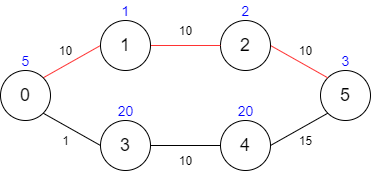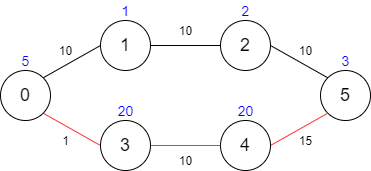Problem
There is a country of n cities numbered from 0 to n - 1 where all the cities are connected by bi-directional roads. The roads are represented as a 2D integer array edges where edges[i] = [xi, yi, timei] denotes a road between cities xi and yi that takes timei minutes to travel. There may be multiple roads of differing travel times connecting the same two cities, but no road connects a city to itself.
Each time you pass through a city, you must pay a passing fee. This is represented as a 0-indexed integer array passingFees of length n where passingFees[j] is the amount of dollars you must pay when you pass through city j.
In the beginning, you are at city 0 and want to reach city n - 1 in maxTime** minutes or less**. The *cost* of your journey is the summation of passing fees for each city that you passed through at some moment of your journey (including the source and destination cities).
Given maxTime, edges, and passingFees, return **the *minimum cost* to complete your journey, or -1 if you cannot complete it within maxTime minutes**.
Example 1:

Input: maxTime = 30, edges = [[0,1,10],[1,2,10],[2,5,10],[0,3,1],[3,4,10],[4,5,15]], passingFees = [5,1,2,20,20,3]
Output: 11
Explanation: The path to take is 0 -> 1 -> 2 -> 5, which takes 30 minutes and has $11 worth of passing fees.
Example 2:

Input: maxTime = 29, edges = [[0,1,10],[1,2,10],[2,5,10],[0,3,1],[3,4,10],[4,5,15]], passingFees = [5,1,2,20,20,3]
Output: 48
Explanation: The path to take is 0 -> 3 -> 4 -> 5, which takes 26 minutes and has $48 worth of passing fees.
You cannot take path 0 -> 1 -> 2 -> 5 since it would take too long.
Example 3:
Input: maxTime = 25, edges = [[0,1,10],[1,2,10],[2,5,10],[0,3,1],[3,4,10],[4,5,15]], passingFees = [5,1,2,20,20,3]
Output: -1
Explanation: There is no way to reach city 5 from city 0 within 25 minutes.
Constraints:
1 <= maxTime <= 1000n == passingFees.length2 <= n <= 1000n - 1 <= edges.length <= 10000 <= xi, yi <= n - 11 <= timei <= 10001 <= passingFees[j] <= 1000The graph may contain multiple edges between two nodes.
The graph does not contain self loops.
Solution
class Solution {
public int minCost(int maxTime, int[][] edges, int[] passingFees) {
final PriorityQueue<Tuple> pq =
new PriorityQueue<>((a, b) -> a.cost == b.cost ? a.time - b.time : a.cost - b.cost);
final int n = passingFees.length;
final int[] minTime = new int[n];
Arrays.fill(minTime, Integer.MAX_VALUE);
final Graph graph = new Graph();
for (final int[] edge : edges) {
graph.addEdge(edge[0], edge[1], edge[2]);
}
pq.offer(new Tuple(0, passingFees[0], 0));
while (!pq.isEmpty()) {
final Tuple curr = pq.poll();
if (curr.time <= maxTime && curr.time < minTime[curr.node]) {
minTime[curr.node] = curr.time;
if (curr.node == n - 1) {
return curr.cost;
}
for (final Edge edge : graph.getEdges(curr.node)) {
final int time = curr.time + edge.weight;
if (time > maxTime || time >= minTime[edge.dst]) {
continue;
}
pq.offer(new Tuple(edge.dst, curr.cost + passingFees[edge.dst], time));
}
}
}
return -1;
}
private static class Graph {
private final Map<Integer, List<Edge>> edges = new HashMap<>();
private void addEdge(final int src, final int dst, final int weight) {
this.edges.computeIfAbsent(src, k -> new ArrayList<>()).add(new Edge(dst, weight));
this.edges.computeIfAbsent(dst, k -> new ArrayList<>()).add(new Edge(src, weight));
}
private List<Edge> getEdges(final int node) {
return this.edges.getOrDefault(node, new ArrayList<>());
}
}
private static final class Edge {
private final int dst;
private final int weight;
private Edge(final int dst, final int weight) {
this.dst = dst;
this.weight = weight;
}
}
private static class Tuple {
private final int node;
private final int cost;
private final int time;
private Tuple(final int node, final int cost, final int time) {
this.node = node;
this.cost = cost;
this.time = time;
}
}
}
Explain:
nope.
Complexity:
- Time complexity : O(n).
- Space complexity : O(n).